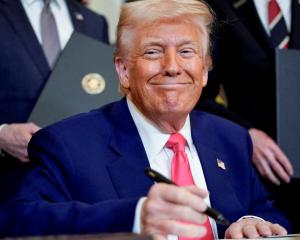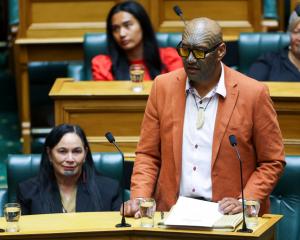Given the election is unlikely to be held before September 20 (to avoid G20 talks in Australia later in the year and domestic events such as All Black test matches) the poll is but a snapshot of a particular time - not an election result.
Interestingly, however, it seems Prime Minister John Key's decision to not rule New Zealand First leader Winston Peters out of coalition reckoning may have helped the wily veteran gain traction.
When polls record results for NZ First, they really reflect the popularity of Mr Peters, nothing else. Without Mr Peters, NZ First would cease to exist.
It bears recalling that in 1996, Mr Peters held the country to ransom by going fishing while National and Labour awaited his decision on who he would support.
Eventually, Mr Peters went with National and Jim Bolger retained his position as prime minister.
The term ''kingmaker'' was bestowed on Mr Peters, a title that resurfaced when he supported Labour's Helen Clark after a later election.
Mr Peters can look back on being sacked by two prime ministers - Mr Bolger and Jenny Shipley - and standing down as a minister under Miss Clark during an investigation into a funding scandal.
After spending one term out of Parliament, Mr Peters re-entered the House with his fellow MPs holding tightly to the coat-tails of his pin-striped suit.
Brendan Horan was later sacked by Mr Peters, but it made no difference to the balance of power because, at that stage, Mr Key had ruled Mr Peters out of contention as a coalition partner.
What has changed?
Much, actually.
Act New Zealand finds itself polling at zero percent in the latest poll, with new president Jamie Whyte facing an uphill battle in re-establishing the party as a viable electoral force.
The Conservatives have yet to make an impression on voters, despite leader Colin Craig appearing to receive advice on making outrageous announcements on the precept any publicity is good for him and his party.
The trouble for NZ First, Act and the Conservatives is that a ''cult'' has been built around their leaders.
Mr Peters is a political survivor, able to read the mood of the electorate and work that mood to his benefit.
Mr Craig will appeal to those who believe the Government should play a lesser role in the lives of New Zealand - his admission he disciplines his daughter is a case in point - and Act has been hurt by poor leadership following the decision to dump Rodney Hide in favour of Don Brash, the man who led National to defeat and saw Act reduced to one MP.
Mr Key has previously explained who he would and would not work with after an election, consistent with what MMP should be.
Labour and the Greens are joined together, but it would be no surprise if, in the interests of political expediency, Labour dumped the Greens if Mr Peters, and United Future leader Peter Dunne, indicated they would work with David Cunliffe in a supply agreement after the election.
The Maori Party is an unknown at this stage, but likely to lose two of its electorate seats to Labour, leaving it with one MP.
What many have missed in analysing recent polls is a lack of success for National, despite the so-called ''rock star'' economy.
Much effort has been made in pointing out the lack of traction by Labour and Mr Cunliffe.
However, with the economy growing, employment growing, billions of dollars being invested in the Christchurch rebuild and a slew of community housing announcements being made in Auckland, National should be rocketing up the popularity ranks.
The fact its support remains around 44%-46% indicates there is a level of unrest that National, and Mr Key, have not been able to appease.
Mr Peters is unlikely to give any indication before the election of whether he would prefer National or Labour in government.
But it is game on and Mr Peters will no doubt enjoy the year - probably at the expense of both major parties.













